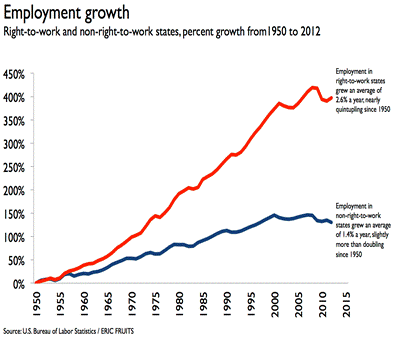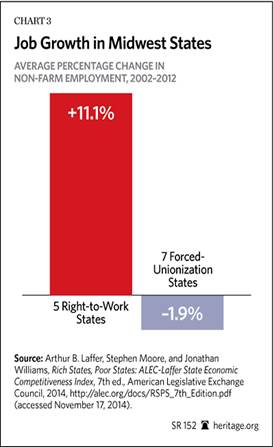JEFFERSON CITY - The last few days of session have been contentious and controversial. I have always supported freedom of association and I was steadfast in my support of Right-to-Work. I supported the bill because Missouri needs Right-to-Work to remain competitive in attracting jobs for the next generation.
 Many union members have argued that their jobs and wages will be at stake if Right-to-Work becomes law. I do not think veteran union members will be at risk, but I am concerned that if we do not pass Right-to-Work the next generation will be short of jobs and wages as potential employers avoid Missouri. Many union members have argued that their jobs and wages will be at stake if Right-to-Work becomes law. I do not think veteran union members will be at risk, but I am concerned that if we do not pass Right-to-Work the next generation will be short of jobs and wages as potential employers avoid Missouri.
According to the Green Bay Press Gazette, Indiana union membership has fared very well under Right-to-Work: “In 2012, when the Right-to-Work law was signed, Indiana's union membership was at its lowest point in 25 years with just 9.1 percent of all workers members of unions. Since then, union membership has actually gone up to 10.7 percent….” Indiana shares many commonalities with Missouri, except they are now a Right-to-Work state. The same report states that 107 new projects have been placed in the state with the developing companies citing Right-to-Work as a factor for locating and expanding in Indiana.
Missouri needs those jobs.
Bureau of Labor Statistics reports also show that Right-to-Work states have surpassed forced-unionization states in job creation for decades with an average of 2.6 percent annual growth in Right-to-Work States and only an average of 1.4 percent growth in forced-unionization states like Missouri.
For 60 years Missouri has been lagging in job creation. It is high time that we fixed this problem.
Looking at just the Midwest, Missouri is losing ground to neighboring Right-to-Work states. From 2002 to 2012, Right-to-Work states in the Midwest enjoyed 11.1 percent job growth while forced-unionization states, again like Missouri, lost 1.9 percent of their jobs. Many of those lost jobs were good-paying union jobs. Many of those lost jobs meant young Missourians never got their career off the ground and are starting at a disadvantage.
Missouri is surrounded by Right-to-Work states that are  attracting jobs for their residents. Iowa, Nebraska, Kansas, Oklahoma, Arkansas and Tennessee are all Right-to-Work neighbors. Only Kentucky and Illinois are following the broken path that Missouri is now on. attracting jobs for their residents. Iowa, Nebraska, Kansas, Oklahoma, Arkansas and Tennessee are all Right-to-Work neighbors. Only Kentucky and Illinois are following the broken path that Missouri is now on.
Right-to-Work will bring jobs and opportunity to Missouri workers. Our state must compete for economic development not just with our neighboring states, but across the entire world. Right-to-Work will make Missouri more competitive and I am certain that my “yes” vote was the right thing to do for the future of our community and our state.
Thank you for reading this weekly column. Please contact my office at (573) 751-3678 if you have any questions.
|



